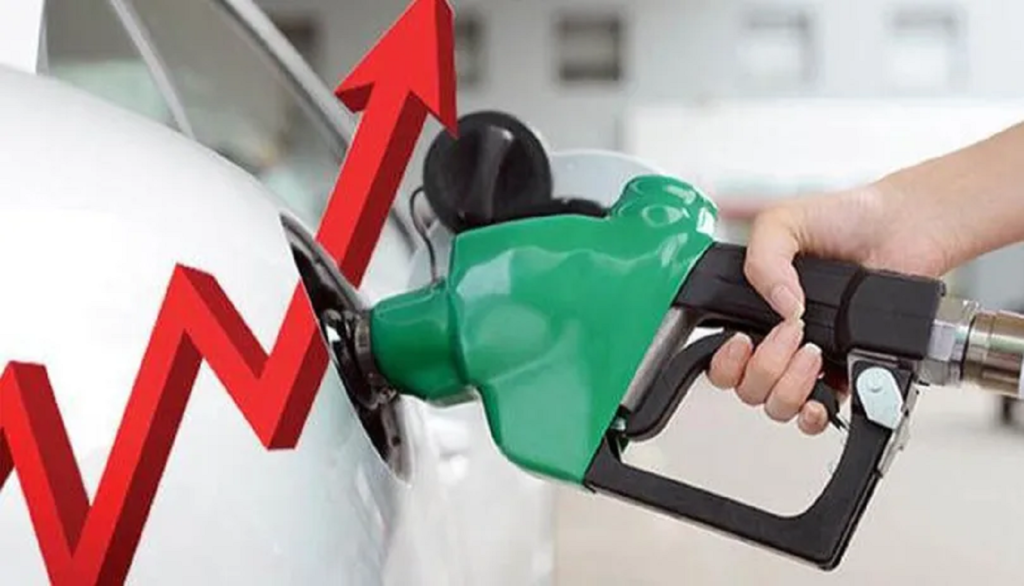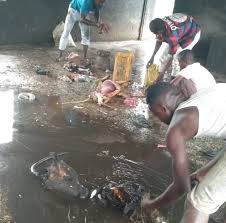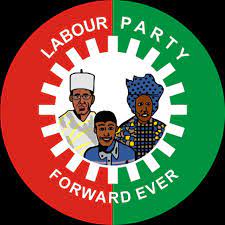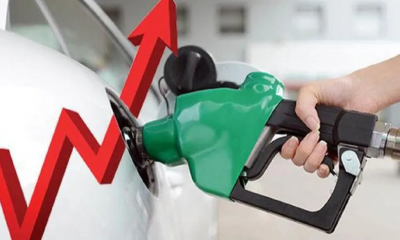NEWS
Naira Crude Sale Has Set Economy on Path of Industrialisation – Edun

Mr Wale Edun, Minister of Finance and Coordinating Minister of the Economy, on Tuesday, said the sale of crude in naira to local refiners had set the Nigerian economy on the path of industrialisation and modernisation.
Edun, chairman of the committee, said this while addressing State House correspondents after a meeting with President Bola Tinubu to review the sale of crude in naira to local refiners at the Presidential Villa.
According to him, the bold initiative, endorsed fully by the Federal Executive Council (FEC), ensures crude oil is sold to local refiners in naira, who in turn sell refined products to marketers in naira.
He said although there was much to be done, but there was a clear path to industrial development and modernisation of the Nigerian economy, because the key prices were right, which was encouraging private sector investment.
“With private sector refining of crude oil, we now have raw materials, not just for agriculture, but for industry, for chemicals, for paints, for building materials and for textiles.
“And of course, this is Mr President’s strategy and his policy of making conditions right for the private sector to invest, create jobs and grow the economy.
“Likewise, the market pricing of petroleum products, has also paved the way for NNPC to restore its balance sheet, restore its financial fortunes, and to give the federal, state and local governments more funding.
“This allows them to meet their obligations, salary payments to workers, social services to the population generally, and key infrastructure development,” said Edun.
The minister said the meeting reviewed the progress of the initiative to ensure that the initial obstacles to successful implementation of sale of cruse in naira to domestic refiners and the correlating sale of petroleum products in naira were overcome.
He said AfreximBank, the financial adviser, was part of the meeting, and would act as an intermediary to ensure that the parties – the seller of the crude, the buyer of the crude – were able to complete their transactions.
Edun said the scheme initiated by the President, was made possible also by the courageous and bold investment of the Dangote group, in a local refinery of 650,000 barrels per day capacity.
He said the implementation committee and the sub committee had worked assiduously with all stakeholders to ensure the initiative was implemented.
The stakeholders include the regulators, Nigerian Midstream and Downstream Petroleum Regulatory Authority (NNDPRA) and Nigeria Upstream Petroleum Regulatory Commission (NUPRC).
Others are: the Nigerian Maritime Administration and Safety Agency (NIMASA) NNPCL, Nigerian Ports Authority (NPA), the Navy and a host host of other stakeholders.
Alhaji Aliko Dangote, chairman, Dangote Refinery and Petrochemical Company, said his company would be able to satisfy local demand with the supply of crude so far by NNPCL.
“This initiative will actually revive a lot of industries in plastic, cooking gas, which is LPG, aviation, gas, Oil, not only PMS.
“At about 420,000 barrels per day, we still have capacity to grow. We are ramping up our capacity. Once we get there, we have enough naira crude, we’ll be able to fully satisfy the market.
“But when NNPC refineries start working going forward, then Nigeria will be one of the biggest exporters of Petroleum products in history,” said Dangote.
He said the President pledged at the meeting to support domestic industries, and allow local refineries to work, and attract more investment into the country. (NAN)
NEWS
Fuel Hike: Experts Seek Speedy Intervention of FG

Some Economic Experts on Thursday urged the speedy intervention of the Federal Government following the hike in the Pump Price of Premium Motor Spirit (PMS) by the NNPC Ltd..
Checks by our correspondent showed that barely three weeks after increasing the pump price, the NNPC Retail Outlets in the FCT on Tuesday increased its fuel pump price again to N1,060 per litre as against N1,030.
our checks also revealed that most filling stations operated by the major marketers retained their old prices.
TotalEnergies and Cornoil fuel stations opposite the NNPC Ltd. Towers still sell at N1,109, Ardova Plc. and NIPCO sell at N1,125 and N1,150 respectively, while Kopdem Nig Ltd.
sell at N1,170 without queues.An oil and gas expert who spoke under annonymity, said the change by the NNPC Ltd. while other marketers maintained their former prices signified that the NNPC Ltd. was trying to catch up with the existing price.
The expert urged the Federal Government to hasten intervention measures towards assisting common Nigerians to convert their vehicles to Compressed Natural Gas (CNG) to alleviate the suffering being experienced due to high price of fuel.
Also speaking with newsmen, Dr Chijioke Ekechukwu expressed worry over the adjustment of pump price, the third time in two months, adding that the increase in price was an additional stress to the hardship being experienced currently.
“We cannot over emphasise the impact these constant increases are having on the hardship being experienced by Nigerians currently.
“Disposable incomes have continued to be eroded, and the quality and standard of living are at their lowest ebb.
“I expect an urgent intervention in this regard to alleviate the sufferings of Nigerians,” he said.
Another expert, Mr Yushau Aliyu who decried inflation said the NNPC Ltd. would continue to adjust pump prices upward unless the domestic functional refineries registered their supply strategy.
“The NNPC Ltd. are bent on using inferior price models grossly influenced and guided by poor exchange rates regime and devastating inflationary measures,” he said. (NAN)
NEWS
Vet Doctor Calls for Law to Guide Abattoir Operations in Nigeria

Dr Mutiu Oladele-Bukola, Veterinary Doctor at the Institute of Agricultural Research and Training (IAR&T), Obafemi Awolowo University, Moore Plantation, Ibadan, has called on governments to institute laws guiding abattoir operations.
Oladele-Bukola made the call in an interview on Thursday in Ibadan.
He said that governments should also enforce absolute compliance to the law for a standard operation by the abattoirs.
He said that the waste management practices in many Nigerian slaughter houses were poor, posing public health and environmental hazards to inhabitants.
According to him, open dump waste disposal and direct disposal of effluents into water bodies are still common practices in many abattoirs.
“These practices expose inhabitants and neighbouring communities to pathogens, with great risks to public health.
“Bacteria and fungi break down these organic materials to produce biomass leading to cellular multiplication.
“Most abattoir effluents are channeled to surrounding water bodies, causing water pollution.
“Many communities in Nigeria get their drinking water directly from rivers and streams that receive these effluents from abattoirs,” he said.
The veterinarian added that these water bodies also served as sources of water for farming activities, exposing plants and animals to pathogenic microbes.
“Polluted animals can lead to food-borne diseases, which could be life-threatening, especially in immune-compromised individuals,” he said.
Oladele-Bukola emphasised the need for improved sanitary conditions and optimal waste management in abattoirs across Nigeria.
He advocated a robust and holistic review of the policies and legislative framework guiding abattoir activities and management in the country.
“Efforts must be made to expedite the passage, and enforcement of the Meat Inspection and Hygiene Act, currently before the National Assembly.
“The said Act should also be reviewed to accommodate expert views on contemporary methods of waste management.
“New policies should reflect and enforce modern standards of waste treatment and disposal in line with global best practices.
“The traditional practice of floor slaughter and carcass dressing should be replaced with the rail system which ensures minimal carcass contamination,” he added.
Oladele-Bukola equally called for improved technology for waste treatment and energy conversion.
He stressed the importance of training for veterinary officers, butchers and abattoir staff for an acceptable level of hygiene and waste management.
“To attract individuals with a good level of formal education to the sector, government and major players must make abattoir jobs socially and economically appealing.
“Proper implementation of waste management systems, education of abattoir workers and enforcement of regulations and compliance to international standards, would contribute to the promotion of both public and planetary health,” Oladele-Bukola said. (NAN)
NEWS
Minister Appoints Kingsley Igwe, CRFFN Registrar

The Minister of Marine & Blue Economy, Alhaji Adegboyega Oyetola, has approved the appointment of Mr Kingsley Igwe as Registrar of Council for the Regulation of Freight Forwarding in Nigeria (CRFFN).
Mr Ismail Omipidan, the ministers spokesman, said this in Statement to newsmen on Thursday in Lagos.
Oyetola said the appointment was part of efforts to reposition CRFFN for better efficiency and management.
He said that Igwe, who was also the National Secretary, National Association Government Approved Freight Forwarders (NAGAFF), took over from the acting Registrar, Mrs Chinyere Uronta.
The appointment was announced in a letter signed on behalf of the Minister by the Director, Maritime Services, Mr Babatunde Sule.
Oyetola said that his appointment was in accordance with the relevant provisions of CRFFN Act 2007 for a duration of four years in the first instance.
He said that Igwe, from Imo State, had Master’s degree in Transportation and also an active member of the CRFFN.
The Minister stated that the appointment was with immediate effect.
Report says that in August 2024, Igwe was the best performing participant at a CRFFN training supervised by the Minister in Lagos.
It would be recalled that the Council had been enmeshed in crisis of confidence and insolvency, leading to its inability to pay salaries since January 2024.
However, Oyetola has stepped in to arrange a bailout loan for the payment of salaries till August. (NAN)

















